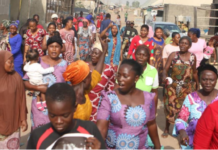and demand the reinstatement of Jimena Lopez
by Lola Akinlosotu
Women members of affiliates of both the Nigeria Labour Congress and Trade Union Congress commemorated the 2015 International Women’s Day across different state capitals. In Abuja, the NLC FCT Women Commission visited the Abuja Children’s Home, where they donated several food items on March 8. The TUC Women Commission organised a symposium in Lagos on March 9. Here Comrade Oyinkan Olasanyo, the Commission’s National Chairperson, presented a paper titled: “The Significance of Celebrating International Women Day”.
Also in Lagos, the NLC State Women Committee in conjunction with the Women in International Transport Federation affiliates in Nigeria (NUATE, NURTW, NURTW, MWUN, ATSSSAN and NUR) organised a solidarity march, which also included women activists from the Federation of Informal Workers’ Organisation of Nigeria (FIWON). One of the demands of the women on this march was for the reinstatement of Comrade Jimena Lopez, the founder and General Secretary of the Ecuadorian Aviation Workers Trade Union. Comrade Jimena is a leading woman member of the International Transport Federation who was sacked for organising in defence of the working class.
Several other activities were organised by the Lagos State NLC Womens Committee up to March 19 around the 2015 International Women’s Day. These included a rally at the National Union of Railway workers national secretariat and a symposium at the headquarters of the National Union of Food Beverages and Tobacco Employees. The continued captivity of the Chibok Girls High School pupils was an issue of concern at these various programmes.
The theme for this year’s International Women’s Day was “Equality for Women, Make It Happen”. The United Nations appropriated the day as UN Day for Women’s Rights and World Peace in 1977. The roots of the International Women’s Day however started with collective struggles organised by socialist working women.
The first ever Women’s Day was organised in New York by the Socialist Party of America on February 28, 1910. It was held as a commemoration of the International Ladies’ Garment Workers’ Union, strike of the year before. The strike organised mainly by immigrant women was massive, lasting fourteen weeks and often described as “the Uprising of the 20,000” women. They defied police brutality and the bosses intimidation to the last.
In August 1911, an International Women’s Conference of 100 women from 17 countries was held as part of the activities of the General Meeting of the Socialist International in Denmark. This conference adopted a resolution on what would eventually be called International Women’s Day. The response the following year was massive. Over a million women and men demonstrated across several countries in Europe on March 19, 1911. They demanded an end to discrimination against women in employment and for their right to vote in general elections.
International Women’s Day became an international phenomenon of struggle from these radical roots. In 1917, to mark International Women’s Day on March 8, women went on strike in Russia. Their demands were for “bread and peace”, being against World War I. This women’s International Women’s Day strike marked the beginning of the Russian Revolution! After the victory of the socialist revolution in Russia, the country made International Women’s Day a public holiday.
It was only by 1977 that the United Nations came to respect the form of the socialist women’s resolution reached 62 years earlier! The history of the International Women’s Day shows that the place of the working woman is not only in the union. Women have a central place in the socialist movement helping to win the self-emancipation of all working women and men, through there own collective struggle.








